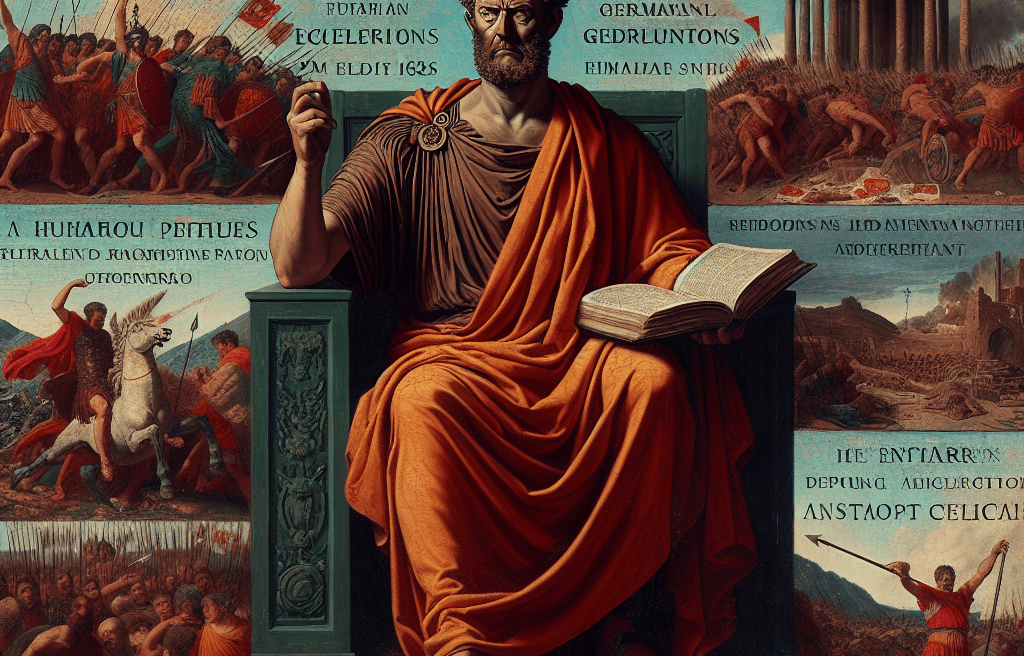The Struggles of Marcus Aurelius: Overcoming Adversity with Stoic Wisdom
Marcus Aurelius, the Roman Emperor and Stoic philosopher, faced numerous challenges throughout his life. This article explores the major struggles encountered by Marcus Aurelius and how he overcame them using Stoic principles, offering valuable lessons for modern readers.
STOICISM
7/6/20242 min read


1. The Burden of Imperial Responsibility
The Challenge:
Unexpectedly thrust into the role of emperor
Enormous pressure of ruling the vast Roman Empire
How He Overcame It:
Embraced duty as a core Stoic virtue
Focused on serving the greater good rather than personal gain
2. Constant Warfare
The Struggle:
Faced ongoing conflicts, particularly the Marcomannic Wars
Required to lead military campaigns despite preferring philosophical pursuits
His Approach:
Applied Stoic principles of courage and resilience
Viewed hardships as opportunities to practice virtue
3. The Antonine Plague
The Crisis:
Devastating pandemic that ravaged the Roman Empire
Caused significant loss of life and economic turmoil
Marcus's Response:
Implemented public health measures
Maintained composure and leadership during the crisis
Used the experience to reflect on human mortality and the importance of living virtuously
4. Personal Health Issues
The Difficulty:
Suffered from chronic health problems, possibly including ulcers and chest pain
His Coping Mechanism:
Practiced Stoic acceptance of physical discomfort
Used illness as a means to cultivate patience and endurance
5. Family Tragedies
The Heartbreak:
Lost multiple children in infancy
Dealt with the infidelity of his wife, Faustina
How He Persevered:
Practiced Stoic acceptance of events beyond his control
Focused on gratitude for the family members he still had
6. Political Betrayals
The Challenge:
Faced betrayal from close associates, including Avidius Cassius's rebellion
His Approach:
Responded with clemency rather than vengeance
Used these experiences to reflect on human nature and the importance of forgiveness
7. Balancing Philosophy and Practicality
The Dilemma:
Struggled to reconcile Stoic ideals with the practical demands of ruling an empire
How He Managed:
Strived for ethical consistency while acknowledging human limitations
Used his position to promote philosophical education and ethical governance
8. The Succession Crisis
The Concern:
Worried about the future of the empire under his son Commodus
His Attempt to Overcome:
Tried to educate and prepare Commodus for leadership
Ultimately accepted the limits of his control over future events
9. Maintaining Personal Growth Amidst Chaos
The Challenge:
Finding time for self-reflection and philosophical study while managing imperial duties
His Solution:
Wrote "Meditations" as a personal journal for self-improvement
Practiced daily self-examination and reflection
10. Confronting Mortality
The Existential Struggle:
Faced the reality of his own mortality and the transience of life
How He Addressed It:
Embraced Stoic teachings on death as a natural part of life
Focused on living virtuously in the present moment
Lessons for Modern Readers
Embrace Duty: Like Marcus, we can find purpose in fulfilling our responsibilities.
Practice Resilience: View challenges as opportunities for personal growth.
Maintain Perspective: Remember that many things are beyond our control.
Cultivate Gratitude: Focus on what we have rather than what we've lost.
Pursue Ethical Consistency: Strive to align our actions with our values, even when it's difficult.
Prioritize Self-Reflection: Make time for personal growth and introspection.
Accept Mortality: Use awareness of life's brevity to live more purposefully.
Conclusion: Timeless Wisdom for Modern Struggles
Marcus Aurelius's life demonstrates that even those in positions of great power face significant personal and public challenges. His application of Stoic principles to overcome these struggles offers timeless wisdom for dealing with adversity.
By studying how Marcus faced his challenges – with resilience, ethical consideration, and a focus on personal growth – we can gain valuable insights for navigating our own difficulties. His example reminds us that true strength lies not in avoiding struggles, but in how we face and learn from them.
In our modern world, filled with its own unique set of challenges, the lessons from Marcus Aurelius's life continue to provide guidance and inspiration. By adopting his approach of combining philosophical wisdom with practical action, we too can strive to overcome our struggles with grace and fortitude.
Waste no more time arguing about what a good man should be. Be one - Marcus Aurelius
We suffer more often in imagination than in reality - Seneca
Wealth consists not in having great possessions, but in having few wants - Epictetus
